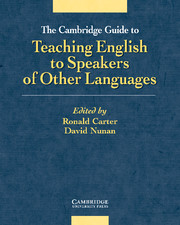Book contents
- Frontmatter
- Contents
- List of figures
- List of abbreviations
- Acknowledgements
- List of contributors
- Introduction
- Chapter 1 Listening
- Chapter 2 Speaking
- Chapter 3 Reading
- Chapter 4 Writing
- Chapter 5 Grammar
- Chapter 6 Vocabulary
- Chapter 7 Discourse
- Chapter 8 Pronunciation
- Chapter 9 Materials development
- Chapter 10 Second language teacher education
- Chapter 11 Psycholinguistics
- Chapter 12 Second language acquisition
- Chapter 13 Bilingualism
- Chapter 14 Sociolinguistics
- Chapter 15 Computer-assisted language learning
- Chapter 16 Observation
- Chapter 17 Classroom interaction
- Chapter 18 English for academic purposes
- Chapter 19 English for specific purposes
- Chapter 20 Assessment
- Chapter 21 Evaluation
- Chapter 22 Syllabus design
- Chapter 23 Language awareness
- Chapter 24 Language learning strategies
- Chapter 25 Task-based language learning
- Chapter 26 Literature in the language classroom
- Chapter 27 Genre
- Chapter 28 Programme management
- Chapter 29 Intercultural communication
- Chapter 30 On-line communication
- Postscript: The ideology of TESOL
- Glossary
- References
- Index
Chapter 6 - Vocabulary
Published online by Cambridge University Press: 07 September 2010
- Frontmatter
- Contents
- List of figures
- List of abbreviations
- Acknowledgements
- List of contributors
- Introduction
- Chapter 1 Listening
- Chapter 2 Speaking
- Chapter 3 Reading
- Chapter 4 Writing
- Chapter 5 Grammar
- Chapter 6 Vocabulary
- Chapter 7 Discourse
- Chapter 8 Pronunciation
- Chapter 9 Materials development
- Chapter 10 Second language teacher education
- Chapter 11 Psycholinguistics
- Chapter 12 Second language acquisition
- Chapter 13 Bilingualism
- Chapter 14 Sociolinguistics
- Chapter 15 Computer-assisted language learning
- Chapter 16 Observation
- Chapter 17 Classroom interaction
- Chapter 18 English for academic purposes
- Chapter 19 English for specific purposes
- Chapter 20 Assessment
- Chapter 21 Evaluation
- Chapter 22 Syllabus design
- Chapter 23 Language awareness
- Chapter 24 Language learning strategies
- Chapter 25 Task-based language learning
- Chapter 26 Literature in the language classroom
- Chapter 27 Genre
- Chapter 28 Programme management
- Chapter 29 Intercultural communication
- Chapter 30 On-line communication
- Postscript: The ideology of TESOL
- Glossary
- References
- Index
Summary
Introduction
Vocabulary and its related research paradigms have many inflections in relation to English language teaching. There is a long tradition of research into vocabulary acquisition in a second and foreign language. These include: classroom-based studies exploring different methodologies for vocabulary teaching; a long history of lexicographic research with reference to English dictionaries for language learners, research which has recently accelerated under the impetus of corpus-based, computer-driven lexical analysis; and new computer-driven descriptions of vocabulary which re-evaluate the place of words as individual units in relation to both grammar and the larger patterns of text organisation.
The main focus in the background section of this chapter is ELT lexicography which provides a relevant basis for several new developments in theory and practice. The focus in the ‘research’ section is on vocabulary acquisition and description, although this should not imply that there has been no lexicographic research. In the ‘practice’ section we turn to pedagogic treatments of vocabulary.
Background
VOCABULARY ACQUISITION
Central to research into vocabulary learning are key questions concerning how words are learned. Teachers help learners with vocabulary directly or ‘explicitly’ by means of word lists, paired translation equivalents and in variously related semantic sets. They also help learners by more indirect or ‘implicit’ means, such as exposure to words in the context of reading real texts. Over many years a key question asked by teachers and researchers is ‘What does it mean to learn a word?’ A definition of learning a word depends crucially on what we mean by a word, but it also depends crucially on how a word is remembered, over what period of time and in what circumstances it can be recalled and whether learning a word also means that it is always retained.
- Type
- Chapter
- Information
- Publisher: Cambridge University PressPrint publication year: 2001
- 11
- Cited by



